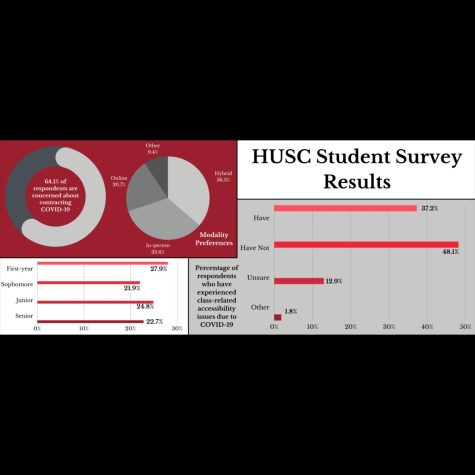Communal living during Covid-19
As the 2020-21 academic year begins, residential students continue to adjust to the different rules and regulations facing them while living in a shared space.
September 24, 2020
As students have moved onto campus and begun the academic year, they have been facing more than the usual challenges the fall semester brings. New policies and guidelines in response to COVID-19 have been put into place at Hamline, and not without some confusion.
Masks are now required almost everywhere on campus and the guest policy for those living in residential halls has also been updated. However, some students have found these changes unclear, and are still not sure about certain things, such as if a friend from another hall can visit them.
“I’m still really not sure if we are required to wear masks outside or not,” said Michael Braun, a first-year. “But it seems like everyone has agreed that we should.”
Students have been directed to wear masks anytime they are in any common indoor area on campus. Outside, masks are required anytime a student is unable to maintain six feet of physical distance from others.
Within dining areas, masks are mandatory except when eating at the socially distanced tables provided.
Rose Marie Athiley, a senior and an RA for the Hamline Apartments, has faced some of these questions from her residents, and has done her best to convey the policies clearly.
“The two rules that are most important for residents to follow are the new guest policy and wearing masks at all times outside of their dorm,” Athiley said.
In their residential halls, students should wear masks in the hallways, laundry facilities and bathrooms, but they are able to take them off inside of their individual residences provided they do not have a guest.
“The guest policy was confusing to my residents,” Athiley said, “In my opinion [it’s] the hardest change, however, we’re in a pandemic and it’s for the safety of the campus.”
The guest policy for campus housing has been updated to only allow students living within the same building to visit each other’s residences. Students can visit with friends who do not meet these qualifications outside or in a common area on campus.
If a student is found to be in violation of the guest policy, consequences can include a fine and other disciplinary actions, according to junior Jacob Cooper, president of the Residential Housing Association (RHA).
Cooper and the RHA have been in regular contact with the RAs, helping them to communicate with their residents.
Safety doesn’t mean isolation, however, and campus leaders believe strongly that it is important to still interact with students and stay engaged on campus, even if how this is done may have changed.
“As an RA, I’m concerned about the wellbeing and mental health of on-campus students,” Athiley said. “There’s no doubt being cooped up inside with limited activities and face to face interactions is going to greatly affect all of us.”
This is something Athiley and other RAs have been working to address, mainly through providing safe ways to connect with other students through virtual gatherings and activities.
“We were told that all events should be virtual and if we truly want to do an in-person event, we would have to fill out a form to be reviewed by a committee,” said Athiley, adding that she has been focusing on online events to engage with her residents.
In addition to activities held by individual RAs, there is also a trivia event every other Wednesday held by RHA on Twitch, and a number of student organizations are also holding virtual events to connect students on and off campus.



